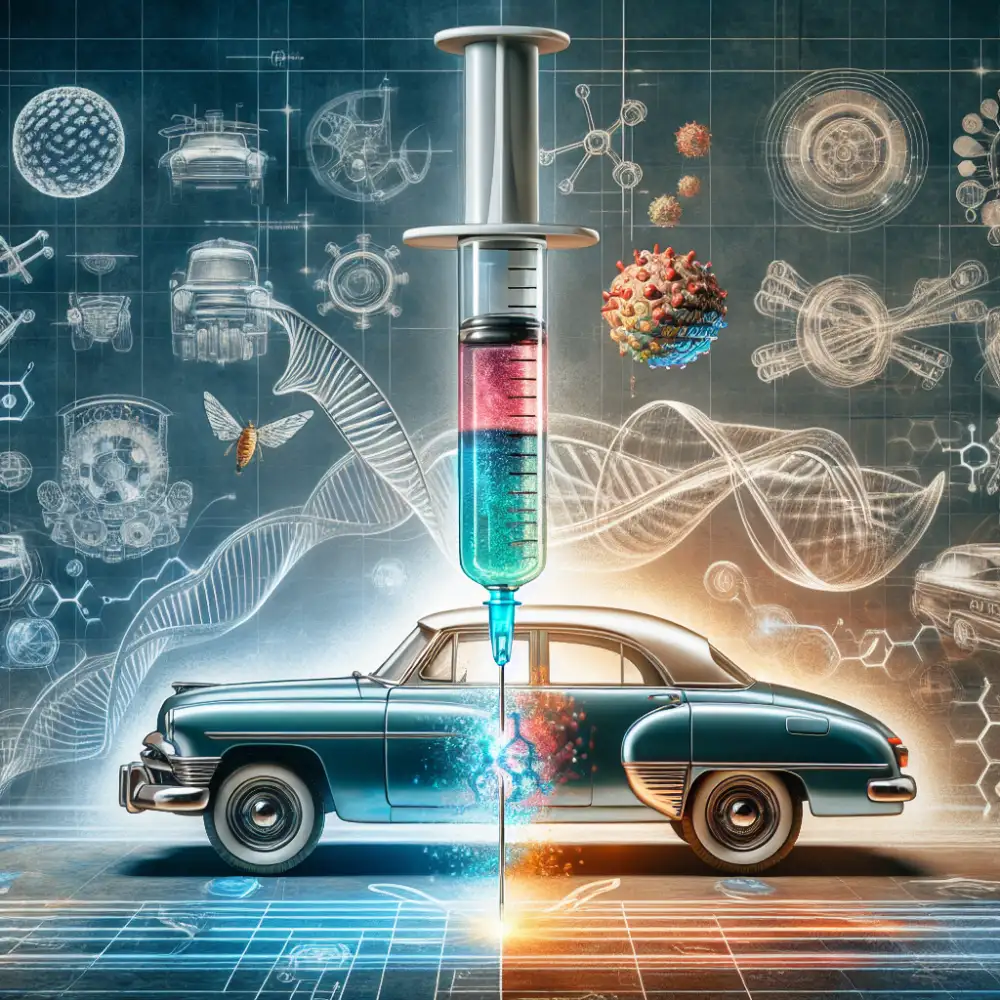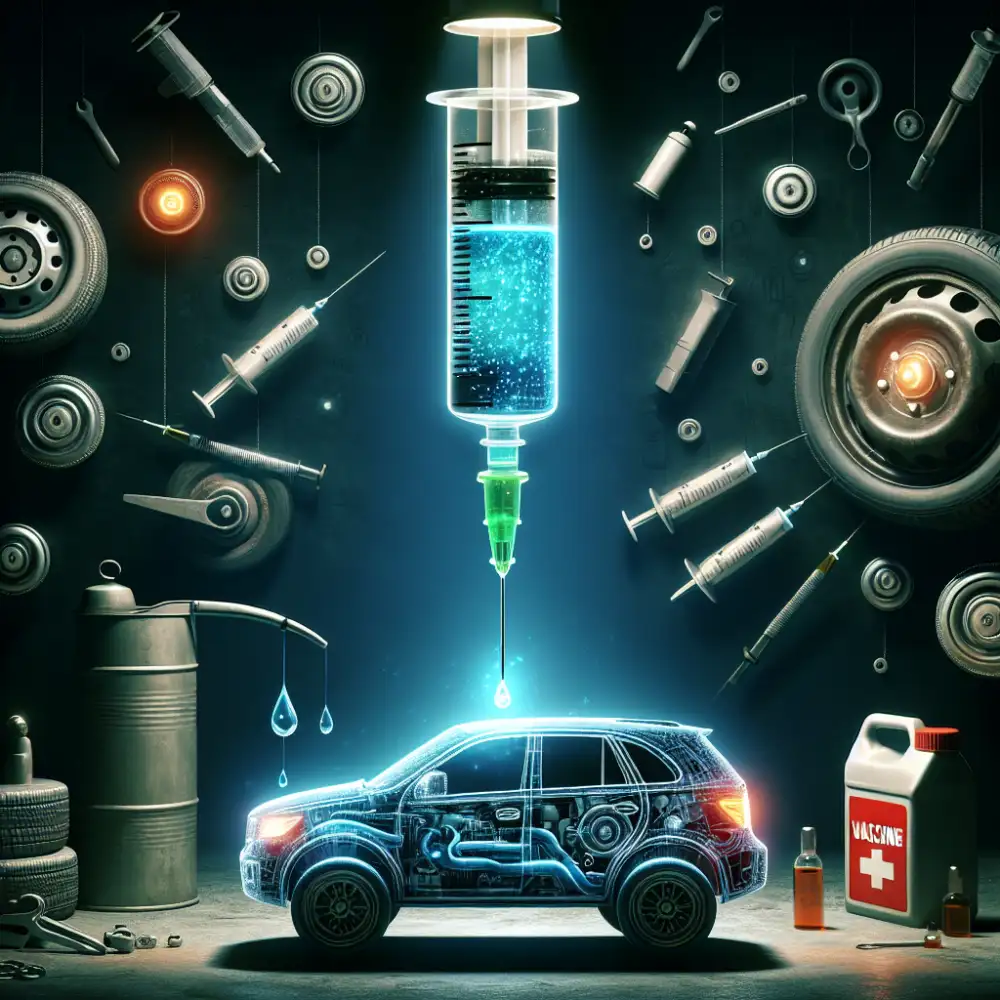Could Car-Engineered Tech Turbocharge Future Vaccines?

Autoimmune Diseases and Driving
There seems to be some confusion in your request. The term "auto vacine" likely refers to "autovaccine," which is a type of vaccine made from a patient's own cells or tissues. These are sometimes used to treat chronic infections or certain types of cancer.
On the other hand, there's no such thing as a "vaccine related to automobiles." It sounds like there might be a misunderstanding or a typo.
When it comes to autoimmune diseases and driving, the main concern is how well a person can manage their condition and any potential side effects from their treatment. Autoimmune diseases affect the immune system, which can lead to a wide range of symptoms like fatigue, joint pain, muscle weakness, and vision problems.
If you have an autoimmune disease, it's crucial to talk to your doctor about whether it's safe for you to drive. They can assess your individual situation and advise you accordingly. Remember, safety should always come first.
Fatigue and Driving Safety
Fatigue is a major safety concern on the road, significantly increasing the risk of accidents. It impairs reaction time, alertness, and decision-making abilities, making it as dangerous as driving under the influence of alcohol or drugs. While there's no "auto vaccine" to combat fatigue, staying informed about the risks and adopting safe driving practices is crucial.
Getting enough sleep before a long drive is essential. If you experience drowsiness on the road, pull over at a safe location and take a break. Consider a short nap, caffeine, or fresh air to help combat fatigue. Remember, your safety and the safety of others on the road are paramount.
Cognitive Function and Driving
Cognitive function is crucial for safe driving, encompassing perception, attention, reaction time, and decision-making. While there's no vaccine directly related to automobiles or driving abilities, maintaining overall health is essential. Vaccines protect against diseases that could potentially impair cognitive function. For example, illnesses like the flu can cause fatigue, brain fog, and slowed reaction times, all of which can impact driving safety.
Staying up-to-date on vaccinations, including the flu shot, can help maintain cognitive health and reduce the risk of accidents caused by impaired driving. It's important to remember that driving under the influence of any substance, including medications taken for illness, can be dangerous. Always consult a doctor about potential side effects of medications and their impact on driving. Prioritizing your health, including staying current on vaccinations, contributes to overall well-being and safer driving.
Vision and Driving
There seems to be a misunderstanding about the term "auto vaccine" and its relation to driving. "Auto vaccine" is likely a typo and doesn't refer to any existing medical or automotive technology.

When discussing "vision and driving," it's crucial to focus on the importance of good eyesight for safe driving. Here's why:
Your vision provides critical information needed to make split-second decisions while driving. This includes judging distances, identifying hazards, and reacting to traffic signals.
Any impairment to your vision, such as nearsightedness, farsightedness, or astigmatism, can significantly impact your ability to drive safely. Regular eye exams are essential to identify and address any vision problems.
Beyond common refractive errors, conditions like cataracts, glaucoma, and macular degeneration can also affect your vision and driving capabilities. These conditions often develop gradually, making it crucial to schedule regular eye checkups, especially as you age.
Remember, maintaining good vision is not just about seeing clearly; it's about processing visual information quickly and accurately, which is vital for safe driving.
Medications and Driving
It is important to consult your doctor or pharmacist about potential side effects before getting any vaccine, including those unrelated to driving. Some vaccines can cause side effects like drowsiness, dizziness, or blurred vision, which could impair your driving ability. It's crucial to prioritize safety and avoid driving if you experience any of these side effects after receiving a vaccine.
While there is no "auto vaccine" specifically designed for automobiles, the term might be a misunderstanding. It's possible that "auto" refers to an auto-injector, a device used for self-administering certain vaccines or medications. Regardless, always clarify any confusion with your healthcare provider and follow their guidance regarding driving restrictions after receiving any medication or vaccine.
Pain Management and Driving
Pain management is crucial after any medical procedure, including vaccinations. Whether you've just received a routine tetanus shot or a specialized vaccine, your doctor can advise you on managing potential discomfort. Over-the-counter pain relievers like ibuprofen or acetaminophen are often sufficient. Applying a cool compress to the injection site can also help reduce swelling and pain.
It's important to remember that driving requires your full attention and the ability to react quickly. If your pain medication causes drowsiness or dizziness, it's not safe to drive. Always follow the instructions provided by your doctor or pharmacist regarding medication usage and potential side effects. Wait until you feel fully alert and your pain is manageable before getting behind the wheel. Your safety and the safety of others on the road are paramount.

Mental Health and Driving
While there's no such thing as an "auto vaccine" or a vaccine directly related to automobiles, your mental health significantly impacts your driving abilities. Stress, anxiety, fatigue, and other mental health conditions can impair your focus, reaction time, and decision-making skills, increasing the risk of accidents.
If you're experiencing significant stress, anxiety, or other mental health challenges, it's crucial to prioritize your well-being and consider how it might affect your driving. Talk to a healthcare professional about your concerns. They can provide guidance, support, and potential treatment options to help you manage your mental health effectively.
Remember, responsible driving starts with a healthy mind and body.
| Feature | Availability | Effectiveness |
|---|---|---|
| Anti-lock Brakes (ABS) | Standard in most modern cars | Proven to reduce accidents |
| Electronic Stability Control (ESC) | Standard in most modern cars | Highly effective in preventing rollovers |
| Lane Departure Warning (LDW) | Available in many new cars | Helps prevent lane departure accidents |
Adapting Vehicles for Disabilities
It seems like you might be mixing up a couple of things! "Auto vaccine" isn't a term you'd typically see. Did you perhaps mean information about adapting vehicles for people with disabilities, maybe in relation to getting around for things like vaccine appointments?
There's a lot to consider when adapting a vehicle for someone with a disability. It's not a one-size-fits-all situation. You've got hand controls for driving, wheelchair lifts or ramps, modified pedals, and even specialized seating systems.
Getting vaccinated is super important, and for some people, their adapted vehicle is their lifeline to get there. Imagine not being able to easily get to a doctor's appointment because your vehicle isn't equipped to get you there safely and comfortably. That's why these adaptations are so crucial.
Resources for Drivers with Conditions
It seems there might be a misunderstanding about the term "auto vaccine." There's no such thing as a vaccine related to automobiles. Vaccines are biological products designed to protect against infectious diseases. Perhaps you were thinking about something else related to cars, like driver safety resources?
If you're looking for information about resources for drivers with medical conditions, there are many organizations that can help. For example, the National Highway Traffic Safety Administration (NHTSA) offers a wealth of information on its website about safe driving practices for people with various health conditions. You can also find resources through organizations like the American Automobile Association (AAA) and AARP.

Remember, if you have any concerns about your ability to drive safely due to a medical condition, it's crucial to talk to your doctor. They can provide personalized advice and help you find appropriate resources.
Tips for Safe Driving with Illness
It is important to prioritize your health and safety when you are behind the wheel. If you are feeling unwell, it is always best to avoid driving. However, if driving is unavoidable, there are some tips to keep in mind.
First and foremost, listen to your body. If you are experiencing any symptoms that could impair your driving, such as dizziness, fatigue, or blurred vision, do not drive. It is crucial to be aware of any medications you are taking and their potential side effects. Some medications, such as cold and allergy medicine, can cause drowsiness and slow reaction times.
Stay hydrated and take breaks. If you are on a long drive, pull over every few hours to stretch your legs and get some fresh air. Keep a healthy snack and water on hand to maintain your energy levels. Adjust your driving to the conditions. If you are feeling unwell, reduce your speed and increase your following distance. Avoid distractions such as talking on the phone or texting while driving.
Remember that driving is a complex task that requires your full attention. By taking these precautions, you can help ensure your safety and the safety of others on the road.
Published: 26. 06. 2024
Category: Health



